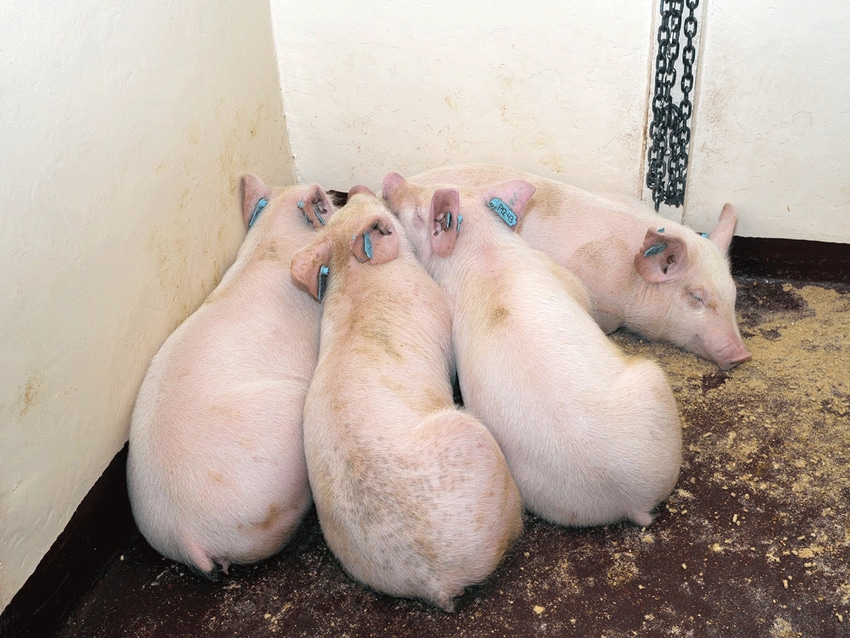Seek Labs reports breakthrough in treatments for ASF utilizing CRISPR
Pigs infected with African swine fever virus and treated with CRISPR-based systems survived longer than untreated infected pigs.
May 6, 2024

Seek Labs, a healthcare innovations company developing next-generation point-of-care molecular diagnostic systems and novel CRISPR-based gene therapies, has announced the successful completion of a therapeutic trial using innovative CRISPR-based technologies to target the African swine fever virus in pigs. The trial, which aimed to replicate and expand an earlier trial, demonstrated pigs infected with ASFV and treated with Seek Labs’ CRISPR-based systems survived longer than untreated infected pigs. Over half of the CRISPR-treated pigs survived beyond the duration of the trial. Observations and data from both studies reveal compelling outcomes where treatment prolonged lifespans of infected pigs compared to control groups.
Innovative CRISPR-based treatment approach
Seek Labs is developing CRISPR-based systems that selectively target pathogenic diseases, including viral infections. This approach disrupts viral replication, slows progress of an infection, and allows treated animals to mount an immune response that can lead to extended survival and even potentially achieve curative outcomes.
Doug Gladue, PhD, an internationally recognized leader in ASFV research and vaccine development, commented on Seek Labs’ innovative CRISPR-based approach: “I have worked on developing vaccine candidates for African swine fever for over 15 years. With no available treatments for African swine fever, this is a breakthrough discovery. These are excellent results that indicate the potential to dramatically increase survivability in pigs against ASFV infection and treat other animal diseases.”
Seek Labs recognizes the potential of CRISPR to tackle infectious diseases across species. The company initially demonstrated their CRISPR-based systems reduce viral load in vivo using a Litopenaeus vannamei shrimp model infected with White Spot Syndrome Virus. These proof-of-concept studies consistently achieved approximately 80% reduction in viral load as validated by qPCR. This outcome correlated with moderate extension in survival times for CRISPR-treated infected shrimp relative to untreated infected shrimp and prompted further anti-viral testing of the CRISPR technology platform.
Seek Labs expanded evaluation of the CRISPR-based systems as anti-viral modalities in pigs infected with ASFV. To this end, the company launched independent in vivo trials. Due to strict regulations in the United States that limit ASF research, Seek Labs conducted the trials overseas in a region where ASF is currently endemic in domestic swine.
“CRISPR is a highly adaptable gene targeting technology that holds enormous potential as a therapeutic modality across genomes,” said Alison O’Mahony, vice president of pharmaceutical research at Seek Labs. “Our CRISPR platform leverages Cas systems and multiplexed gRNAs to selectively target pathogenic genomes.”
ASF and its threat to global health
ASF is a rapidly spreading, highly contagious viral disease that decimates pig populations worldwide. The mortality rate for the current pandemic strain of ASF is close to 100%, with infected pigs being symptomatic within days and typically succumbing to the disease within two weeks. No effective prophylactic or therapeutic strategies are available for ASF, and the standard management of the disease is currently stringent herd culling. ASF is a significant threat to the global swine industry, encompassing domesticated pigs, feral pigs and wild boars. While early outbreaks were largely confined to the African sub-continent, incidents of ASF outbreaks have increased in frequency since 2007.
ASF’s ongoing threat to the pork industry, as well as to food security worldwide, is substantial, affecting prices, production and trade dynamics. Pork is the second most consumed source of protein globally, making up 36% of all consumed meat. A 2019 outbreak of ASF in China led to the decimation of 40% of all hogs globally between 2019 and 2022. The 2019 outbreak of ASF is estimated to have caused a USD $196.2 billion loss to the industry. Observing the devastating effects of ASF on the global economy and food supply, Seek Labs began developing an innovative gene therapy approach involving a viral gene-targeting CRISPR system that could be deployed as a treatment for ASF.
In Vivo ASFV trial design
Seek Labs is advancing two CRISPR-based systems with multiplexed ASFV-targeting gRNAs for in vivo testing: Candidate SL_1.52, which comprises a single Cas-encoding construct, and Candidate SL_1.52/SL_1.45 Combo, which comprises a combination of two Cas-encoding constructs. Both ASFV-targeting candidates were administered to infected pigs via intramuscular injections either as a single dose on one day or as a double dose on two consecutive days. All pigs were monitored daily for four weeks for the appearance of infection-related symptoms. Per the study protocol, pigs were weighed and blood was drawn and tested for the presence of an ASF virus gene using qPCR, as well as for anti-ASFV antibodies by ELISA assays.
Trial outcomes
The trial demonstrated Seek Labs’ CRISPR candidates prolonged survival in ASFV-infected pigs treated with candidates and achieved curative outcomes in a subset of the treated pigs. Data show 57% of the CRISPR-treated cohorts survived longer than the control cohort. Not only did the CRISPR-treated cohort survive beyond the end of the trial, but this cohort was observed to be consistently more physically active and responsive to stimuli throughout the trial. Data also indicate CRISPR targeting of the ASFV genome decreased viral load. Taken together, these data suggest ASFV did not lead to a lethal infection in multiple CRISPR-treated pigs.
Future research and studies
All surviving pigs are now being tested for protection against reinfection. Future studies will also look at efficacy outcomes following prophylactic versus therapeutic delivery of the CRISPR-based systems. The company is considering applications in new viral outbreaks, including ongoing avian influenza (H5N1) outbreaks that have already transmitted from chickens to cows and impacted food supply in the United States. Seek Labs will continue pursuing innovative gene editing technologies to expand anti-viral and disease treatment strategies. Seek Labs’ work represents a beacon of hope for the swine industry and underscores the transformative potential of CRISPR-based technology in global healthcare.
You May Also Like



